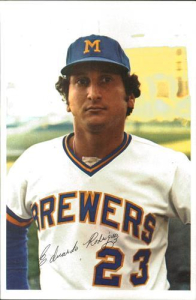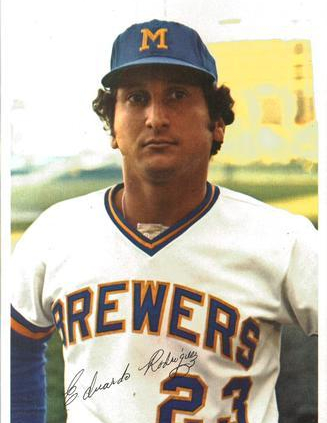September 3, 1973: Brewers’ Eduardo Rodríguez triples for first hit by AL pitcher in DH era
 Neither team was in contention when the Milwaukee Brewers and Cleveland Indians played a Labor Day doubleheader at Milwaukee County Stadium in 1973. In fact, both were under .500 and bringing up the rear in the American League East Division.
Neither team was in contention when the Milwaukee Brewers and Cleveland Indians played a Labor Day doubleheader at Milwaukee County Stadium in 1973. In fact, both were under .500 and bringing up the rear in the American League East Division.
Perhaps the biggest attraction was Gaylord Perry’s presence on the mound for Cleveland. The reigning AL Cy Young Award winner and eventual Hall of Famer was suffering through his most difficult campaign since 1965, the year before the San Francisco Giants converted him into a full-time starter.
Repeating his league-leading 1.92 ERA of 1972 would have been a hard task for the 34-year-old Perry, though few observers imagined he would keep pitching until age 45, well into the 1980s.1 Still, he had won seven of his last nine decisions—four shutouts and three other complete-game wins—to push his record to 15-17.
As the 1973 season entered its final stretch, Perry and his fellow AL hurlers were dealing with the most significant rule change since the junior circuit and its elder partner signed a “peace agreement” in 1903. To boost offensive production, the AL had decided to “experiment” with a designated hitter to bat instead of the pitcher.
Opposing Perry in the first game of the twin bill was the Brewers’ Jim Slaton, a 23-year-old California-born right-hander in the third of what turned out to be 16 seasons in the big leagues. Selected by the Seattle Pilots in the June amateur draft in 1969, Slaton reached the majors two years later, after the franchise relocated to Milwaukee. He tossed more than 200 innings seven straight years, beginning with 1973.
In the top of the first, Slaton allowed a single to Oscar Gamble but emerged unscored on. Perry, on the other hand, labored. A leadoff single by Joe Lahoud, a wild pitch, a sacrifice fly by Bob Coluccio, and Dave May’s double scored the first run. George Scott walked and Don Money drove in May with a single before Perry induced catcher Darrell Porter to hit into an inning-ending twin killing, but the Brewers led, 2-0.
An uneventful second inning maintained the status quo. The Indians broke through in the third, after Frank Duffy’s leadoff single. He was erased by a fielder’s choice. Gamble, now the runner, scored on Chris Chambliss’s two-bagger.
Goose eggs ensued in the fourth and fifth frames, and the 2-1 score held until the bottom of the sixth. May, who had singled, was on first with two out when Money reached on shortstop Duffy’s error. Porter doubled to right, driving in May, and Money scored from first on right fielder John Lowenstein’s error on Porter’s hit, making it a two-run inning for the locals.
All three Cleveland batters flied out in short order in the seventh, setting the stage for a Milwaukee explosion. Tim Johnson walked, Pedro García singled, and Lahoud’s hit drove in Johnson. After the runners advanced to second and third on a comebacker to the mound, May was walked intentionally to load the bases. The move backfired when Scott singled, scoring García for a 6-1 Milwaukee lead and leading to Perry’s removal from the game.
His replacement, the 1971 Sporting News Fireman of the Year Ken Sanders, allowed a bases-clearing double to Money, the first batter he faced, ballooning the advantage to 9-1. Porter connected for a two-bagger to drive in Money. The inning ended after Bobby Mitchell and Johnson grounded out, but the Brewers had batted around to build a daunting 10-1 lead after seven frames.
The next series of events etched the game into baseball history. Brewers manager Del Crandall juggled his defenders. Mitchell, who had been the designated hitter, took left field. Coluccio moved from left to center, and John Vukovich entered to cover first base. May, whose 134+ OPS for the year was second-best on the team behind Scott’s 144, left the game. Given the doubleheader, perhaps Crandall wanted to give a few of his regulars a few innings of rest.
The designated-hitter rule soon led to a peculiar consequence for the Brewers. “Once a designated hitter assumes a defensive position this move shall terminate the designated hitter role for the rest of the game,” the new rule mandated.2 With Crandall’s lineup shuffle taking Scott out of the game, the fourth spot in the Brewers lineup went to the pitcher, although Vukovich remained in the lineup defending first base.
The Indians batters finally woke up in the bottom of the eighth. Chambliss’s single, a walk to Ellis, Lowenstein’s single, and a double by Williams produced two runs. Torres struck out, but Brohamer singled to right, driving in Lowenstein to make it a 10-4 game and chasing Slaton from the mound.
Crandall brought in Eduardo Rodríguez, a 21-year-old rookie right-hander from Puerto Rico who was pitching in his 25th big-league game since debuting in June. Rodríguez struck out Duffy, but Bell singled to left, scoring Williams and advancing Brohamer to second. The runners were stranded when Gamble lined out to third, but Milwaukee’s lead was down to 10-5.
As the bottom of the eighth started, Indians manager Ken Aspromonte brought in Jerry Johnson to relieve. The 6-foot-3 right-hander allowed a one-out single to Lahoud. Coluccio’s deep fly marked the second out, but Vukovich blasted a two-run home run, extending the Brewers’ advantage to 12-5.
Milwaukee had reached the fourth spot in its batting order—now occupied by Rodríguez, batting for the first time in the majors.
He was not expecting to bat. The Milwaukee Sentinel reported that when Crandall sent him up, Rodríguez replied, “[n]o, pitcher [doesn’t] bat.”3 The LaCrosse Tribune expanded on the exchange: “I don’t believe him when he tells me to bat,” Rodríguez added, aware that “I’m a poor hitter—so-so, maybe—but I got about seven hits in 20 at bats in Class A at Danville last year.”4
Regardless, Rodríguez hit a line drive that rolled to the wall in right-center. Third-base coach Joe Nossek put up the stop sign, but Rodríguez kept going to third and slid in. Cutoff man Jack Brohamer’s wild throw missed the bag, allowing Rodríguez to score.5
Newspaper coverage reported that May, from the Milwaukee dugout, gave Rodríguez a “standing ovation” as he returned to pitch the ninth.6 Rodríguez allowed one walk but induced three groundballs to close the game, 13-5, for his fifth save of the season.
The newspapers noted the oddity of a pitcher hitting a triple, but a deeper examination revealed that it was the first hit of any kind by an AL hurler in 1973. The LaCrosse Tribune noted that only two other AL pitchers had batted all season, thanks to the designated hitter rule: “Cy Acosta of the Chicago White Sox [who batted on June 20] and Rollie Fingers of the Oakland A’s [who batted on June 26], both of whom struck out.”7
The Cleveland Plain Dealer focused on the twin bill’s split but added, “[R]eliever Eduardo Rodríguez tripled and scored on a muffed relay from the outfield to add to the first-game humiliation.”8
Only one other AL pitcher, Catfish Hunter, recorded a hit during the regular season in 1973, but the Oakland A’s ace did so as a pinch-hitter on September 24.9
AL hurlers had just nine total regular-season at-bats that year; Hunter and Rodríguez connected for the only hits.10 The Sporting News mentioned Rodríguez’s feat as part of a long column evaluating the DH experiment, quoting the pitcher: “I don’t understand the rule. I’m not such a good hitter, but everybody likes to hit. Now I’m happy and feel good. I want to hit some more.”11
Rodríguez had begun the year with Shreveport of the Double-A Texas League, where his numbers (10 games, 26 innings, three runs allowed, one of which was earned) merited a quick promotion to Triple-A Evansville. In 37 frames with the American Association club, he sported a 2.43 ERA, and his repertoire earned positive reviews from his manager, Mike Roarke: “He has a couple of pitches besides his fastball and he changes speed … has a slider he can throw for strikes, plus a little curve and throws from different angles.”12
Rodríguez had a solid maiden campaign after his call-up, winning nine games, losing seven, and saving five as he alternated between the starting rotation and the bullpen. He enjoyed six other seasons in the big leagues and totaled 264 pitching appearances (42-36, 3.89 ERA) but no other plate appearances.
Rodríguez’s stat line (1.000 average, 1.000 on-base-percentage, 3.000 slugging percentage, 4.000 OPS) would likely win many a trivia contest, but the randomness does not end there. While 19 other players have tripled for their only major-league hit, only three others have done so in their sole lifetime at-bat: Eric Cammack (2000) and Charlie Lindstrom (1958), who both drove in a run but were themselves stranded, and Scott Munninhoff (1980), who led off an inning and scored. Curiously, Lindstrom was the only position player of the quartet.
Sadly, Rodríguez died young at age 57 in 2009 in his hometown of Barceloneta, Puerto Rico. Fittingly for a man whose hitting career provoked questions of “what are the odds,” he died on March 6, his birthday.
Acknowledgments
This article was fact-checked by Mark Richard and copy-edited by Len Levin.
Sources
Besides using the sources listed in the Notes, the author consulted Baseball-Reference.com and Retrosheet.org for pertinent information, including the box score and play-by-play.
https://www.baseball-reference.com/boxes/MIL/MIL197309031.shtml
https://www.retrosheet.org/boxesetc/1973/B09031MIL1973.htm
Notes
1 Perry turned 35 years old 12 days after this game, on September 15. He was 45 years and 6 days old on September 21, 1983, when he pitched his last major-league game.
2 “Here’s How Rule Reads,” Minneapolis Star, March 31, 1973: 15A.
3 Lou Chapman, “Brewers, Tribe Split,” Milwaukee Sentinel, September 4, 1973: 1, 2.
4 Mike O’Brien (Associated Press), “Fans Get Money’s Worth as Brews Split Twin Bill,” LaCrosse (Wisconsin) Tribune, September 4, 1973: 12. Rodríguez actually had five hits in 23 at bats in the minors that year.
5 Brohammer started a triple play in the first inning of the nightcap, a 10-5 Cleveland win.
6 Mike O’Brien, “Fans Get Money’s Worth as Brews Split Twin Bill.” La Crosse (Wisconsin) Tribune, September 4, 1973: 10.
7 O’Brien, “Fans Get Money’s Worth as Brews Split Twin Bill.”
8 Russell Schneider, “Perry Loses in Tribe Split/Perry Beaten, but Indians Split,” Cleveland Plain Dealer, September 4, 1973: 1D, 3D.
9 Hunter, 149-for-658 in his career, averaged .350 in 1971 and was a lifetime .226/.234/.287 batter.
10 The designated hitter was not used in the 1973 World Series, and Oakland’s Ken Holtzman and Fingers combined for three hits in the A’s win over the New York Mets.
11 Bob Broeg, “Broeg on Baseball,” The Sporting News, September 29, 1973: 6.
12 “American Association,” The Sporting News, June 23, 1973: 40.
Additional Stats
Milwaukee Brewers 13
Cleveland Indians 5
Game 1, DH
Milwaukee County Stadium
Milwaukee, WI
Box Score + PBP:
Corrections? Additions?
If you can help us improve this game story, contact us.


